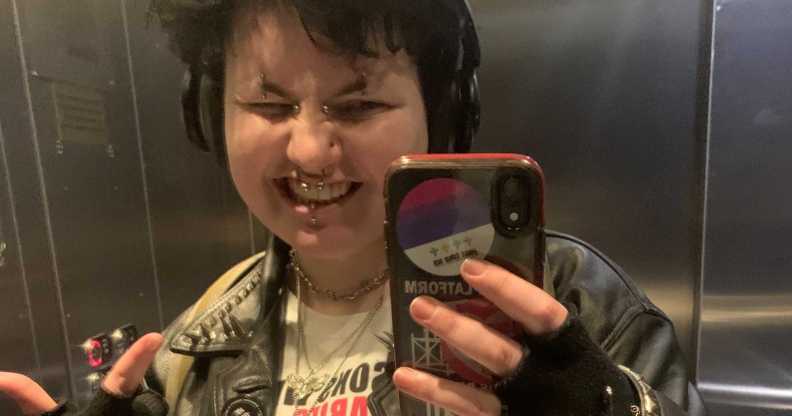‘I was outed in school – this is how I coped’

Matty Robins volunteers as an ambassador for Just Like Us, the LGBT+ young people’s charity. (Matty Robins)
“It’s National Coming Out Day, and the LGBT+ community are once again reminded that coming out is still a necessary process in the queer experience.
In an ideal world, coming out and “outing” wouldn’t be a thing – we would just be our authentic selves without anyone questioning it.
However, while we still need days like National Coming Out Day and while coming out is still something that LGBT+ people have to do, “outing” is still a reality for some of us.
“Outing” someone is when a person discloses another person’s LGBT+ identity without that person’s permission. This can come in the form of rumours or gossip, a slip of the tongue, social media posts, or even a grand announcement, but in my experience, it was all of the above.
Outing was my worst nightmare as a young queer kid. Trying to figure out what to do with my newly found identity, I found it difficult to find someone to confide in and trust with the huge news that I was transgender. It was difficult to even come out to myself, let alone other people.
‘I wasn’t ready’
Luckily, the other LGBT+ people in my school were there for me and when I told one of the girls in my class, she was ecstatic. She finally had another LGBT+ person in our form group and she clung on to me. While her enthusiasm was appreciated, she pressured me to come out to the rest of our form group and ran around telling the other LGBT+ people in our year group that I was transgender.
I wasn’t ready. I wasn’t even ready to begin a social transition. I didn’t know how to tell my parents that I wanted to cut my hair or wear trousers in my school uniform instead of a skirt. So when I had my form group confront me and ask what this whole transgender thing was all about, I shut down. I forced myself back in the closet, denying my identity.
However this led to further bullying.
Many of the girls in my class would make a big deal out of me being misgendered by teachers, despite not having told the school yet. It was daunting – I didn’t have any teachers I could go to to talk to about this.
Many of the teachers, after they were told about my situation, refused to believe me. My other friends who were questioning their gender identity got support from the school, but the school refused to accept I was transgender or having issues with being outed.
I eventually had to leave the school for various reasons outside of having been outed and lack of school support, but getting a fresh start in a new school was exactly what I needed, where I could come out in my own time.
This wasn’t the end of me being outed however. I confided in my sister when I was 15 that I was transgender and she told my parents. In a way, it was a blessing in disguise. Despite me feeling caught off-guard by my parents sitting me down and confronting me about what my sister told them, I was relieved I didn’t have to say it myself. However, this doesn’t mean I wanted to be outed. No one wants to have their identity disclosed without their permission. It was a terrifying experience as at the time I didn’t know whether I was in a safe household to be openly LGBT+.
‘Safe spaces can help us realise we aren’t alone’
I have been out openly as transgender for over 6 years now. I’ve managed to forgive the people that did out me, like my secondary school friend and my sister. However, the fear and anxiety has never left me. It’s still scary when someone asks if I’m trans or if I have to disclose my identity in surveys or information forms. However I have managed to cope with the aftermath and move on from those experiences.
If you have been outed or are trying to move on from being outed, here’s some advice from me:
- You don’t have to forgive anyone who outs you. Being LGBT+ in the current climate is scary. You don’t know who’s going to react with hostility or who will react with open arms. It’s important to put your own mental health and physical well-being before someone else’s feelings on this matter. Outing can be dangerous and put people at risk of serious harm.
- Seek out someone who you can confide in. This can be a teacher, someone at work, a friend, family member, or even a therapist. Outing can cause a lot of anxiety, fear, and big emotions to arise, so talking this through with someone who can offer comfort and acceptance is vital before it starts to spill over and cause a lot of damage.
- There are safe spaces out there for you. Across the UK, there are many forums and dedicated groups out there that are specialised in supporting LGBT+ people of all ages. It can feel really lonely when you first come out, especially if you live somewhere with not a huge LGBT+ presence, but safe spaces can help us realise we aren’t alone.
Outing is a phenomenon that terrifies LGBT+ people across the globe as our rights continue to be debated. This National Coming Out Day, it’s important to celebrate joyful experiences of coming out, but also to raise awareness of the all-too-common situations where the autonomy of coming out is taken away from us.
Matty volunteers as an ambassador for Just Like Us, the LGBT+ young people’s charity. LGBT+ and aged 18 to 25? Sign up here.

